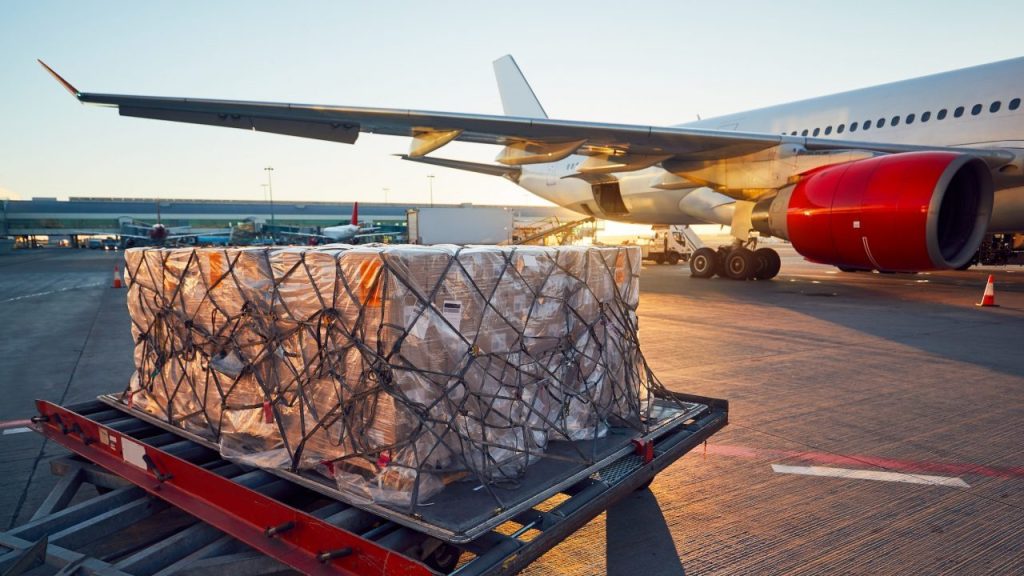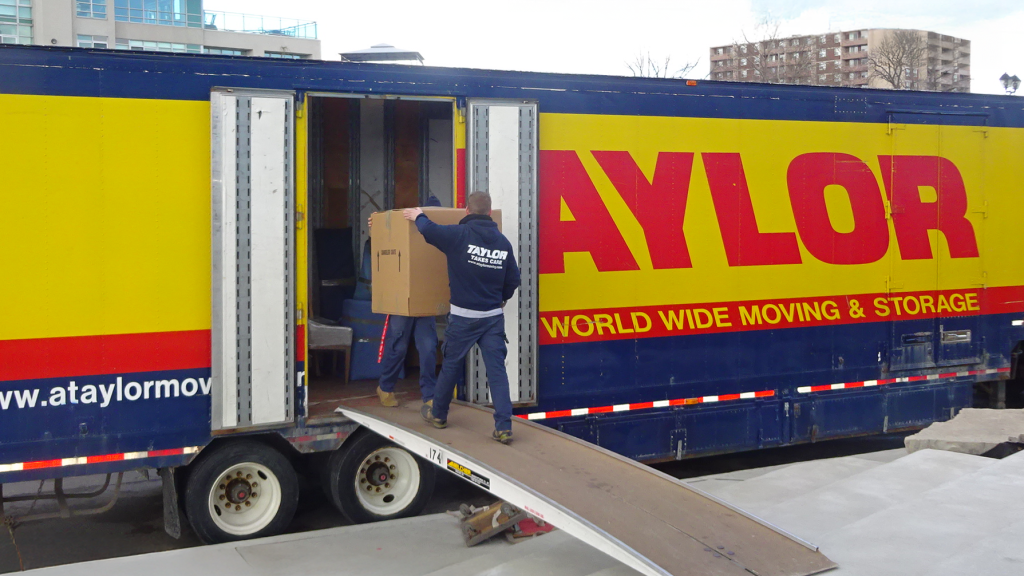
International Moving between Canada and Scotland
Moving overseas to or from Canada and Scotland? Learn more about packing, shipping, and customs to make your international relocation stress-free.
Planning Your Move
The first step in your international move is a tailored assessment of your needs. You can complete our AI-powered survey or meet with our consultants via Zoom, Google Meet, or in person. During this consultation, we’ll determine your packing requirements, customs considerations, and other key details.

Why Choose Taylor International?
We offer flexible, high-quality moving solutions through our extensive supply chain. As members of the International Association of Movers (IAM) and Fédération Internationale des Déménageurs Internationaux (FIDI), we provide access to a vast global network, ensuring reliable service with backup options for a seamless transition.
- Premium Service: Our FIDI-certified partners offer top-tier care.
- Budget-Friendly Options: IAM-certified movers provide reliable, cost-effective solutions.
- Balanced Approach: We customize packages to match your priorities.
- Diversified Supply Chain: No matter the option selected in the event of a major issue, we have back-up plans to ensure your move is performed with your customized plan.
- Extensive 3rd Party Partnerships: Our network also encompasses a vast array of 3rd party services from appliance disassembly, gym disassembly and other critical expert assistance to ensure your items are protected.
- Robust Cybersecurity: Our methods, procedures and systems enable your most sensitive information to be secure.
- Customs Mastery: Our international move managers work with you to ensure that you can navigate the complexities of customs, imports, exports and local regulations with the upmost care.
- Comprehensive Insurance: Taylor International provides full replacement value so you do not need to worry about the what ifs and instead focus on the will bes when you get to your destination. We will also source any services needed to render this service globally.
Our strict vetting process ensures only top-performing providers handle your shipment. If a supplier doesn’t meet our standards, they’re removed from our network—your satisfaction is our priority.
Choosing the Right Shipping Method
We help you select the most efficient transport option:

Sea Freight
The most economical choice for most moves.

Air Freight (LTL)
Faster delivery at a premium.

Hybrid Solutions
Essential items arrive by air, with the rest shipped via sea.
No matter your budget, we’ll find the best option for you.
Your Moving Journey
After your consultation, our specialists create a personalized moving plan and provide a detailed quote. Once confirmed, a dedicated moving coordinator will manage the process, ensuring smooth navigation of documentation, customs, and compliance requirements—avoiding delays or unexpected fees.
Relocating from Canada to Aberdeen, Scotland’s third-largest city, offers an exciting opportunity to experience a strong economy, stunning coastal scenery, and a high quality of life. Known as the “Granite City” for its distinctive architecture, Aberdeen has a booming energy sector, top universities, and excellent transport links. Whether you’re moving for work, study, or lifestyle, here’s what you need to know for a smooth transition.
Visa & Immigration
Canadians moving to Aberdeen for work will typically need a Skilled Worker Visa, which requires a job offer from a UK-based employer. If you’re coming for education at the University of Aberdeen or Robert Gordon University, a Student Visa is required. Those with specialized skills or looking to start a business may explore options like the Global Talent Visa or Innovator Visa. It’s recommended to start your visa application well in advance.
Finding Accommodation
Aberdeen offers a range of housing options, from city-center apartments to spacious suburban homes. Popular residential areas include:
- West End – Affluent, historic architecture, close to the city center.
- Bridge of Don – A family-friendly area near major employers in the energy sector.
- Cults & Peterculter – Ideal for those seeking a suburban or semi-rural lifestyle.
- Old Aberdeen – Close to the University of Aberdeen, great for students and academics.
Rental prices in Aberdeen are lower than in Edinburgh or Glasgow due to recent economic shifts in the energy industry, making it a buyer’s and renter’s market. Landlords typically require proof of employment, references, and a deposit.
Cost of Living & Banking
Aberdeen’s cost of living is moderate compared to Canadian cities like Toronto or Vancouver, though energy prices can be higher due to the climate. The city has a strong job market, especially in oil, gas, and renewables, making it an attractive destination for professionals.
Opening a UK bank account with Barclays, Lloyds, HSBC, or the Bank of Scotland is advisable. Canadian banks like Scotiabank and RBC offer international services to assist with the transition.
Healthcare & Insurance
Healthcare in Aberdeen is covered by the National Health Service (NHS). Upon arrival, you should register with a General Practitioner (GP) to access NHS services. While NHS care is free, private health insurance may be useful for quicker access to specialists.
Adapting to Aberdeen’s Culture & Lifestyle
Aberdeen is known for its coastal beauty, strong job market, and rich history. The city’s economy is heavily linked to the oil and gas industry, but it’s also emerging as a hub for renewable energy and life sciences.
Weather: Aberdeen has a cool and often windy climate, with colder winters than most parts of Scotland. Warm clothing and waterproof gear are essential.
Transport: The city has buses and a well-connected train station, and Aberdeen Airport offers flights across the UK and internationally. If you plan to drive, remember the UK follows left-hand driving.
Lifestyle: The city has great restaurants, a strong cultural scene, and outdoor activities like hiking, golfing, and coastal walks. It’s a short drive from the Scottish Highlands, making it perfect for weekend getaways.
With its economic opportunities, lower cost of living, and strong community feel, Aberdeen is a fantastic option for Canadians looking for a new home in Scotland. A destination service provider can help streamline the moving process and ensure a smooth transition into Aberdeen life.
Relocating from Canada to Dundee, Scotland’s fourth-largest city, offers an exciting opportunity to enjoy a thriving tech scene, cultural renaissance, and affordable living. As a city known for its innovation, universities, and scenic waterfront, Dundee is an increasingly popular choice for professionals, students, and families alike. Here’s what you need to know for a smooth transition.
Visa & Immigration
If you’re moving to Dundee for work, you’ll likely need a Skilled Worker Visa, which requires a job offer from a UK-based employer. Those studying at the University of Dundee or Abertay University will need a Student Visa. If you plan to start a business or have high-demand skills, options like the Global Talent Visa or Innovator Visa may apply. Since visa processing times vary, it’s best to start your application as early as possible.
Finding Accommodation
Dundee is known for having some of the most affordable housing in Scotland, making it a great choice for those seeking a lower cost of living. Popular residential areas include West End (close to the university), Broughty Ferry (seaside living), and City Quay (modern apartments near the waterfront). Rental prices are lower than in Edinburgh or Glasgow, but demand is high, so securing accommodation in advance is recommended. Landlords typically require proof of employment or university enrollment, references, and a deposit.
Cost of Living & Banking
Dundee’s cost of living is significantly lower than in major Canadian cities like Toronto or Vancouver. Housing, transportation, and entertainment are all reasonably priced, making it an attractive city for young professionals and families. Opening a UK bank account with Barclays, Lloyds, or HSBC is advisable, and Canadian banks like RBC and Scotiabank offer international services to help with financial management.
Healthcare & Insurance
As a UK resident, you’ll have access to the National Health Service (NHS), which is free at the point of use. Registering with a General Practitioner (GP) in Dundee is essential for accessing healthcare. While NHS services cover most needs, some expats opt for private health insurance for faster specialist appointments.
Adapting to Dundee’s Culture & Lifestyle
Dundee is a young, vibrant city with a strong student population and a growing reputation as a tech and gaming hub (home to Abertay University’s gaming program and companies like Rockstar North). The V&A Museum, waterfront developments, and buzzing food scene make it an exciting place to live. The weather is mild but often rainy, so waterproof clothing is a must.
Public transportation includes buses and train connections, but Dundee is also very walkable. If you plan to drive, remember that the UK follows left-side driving.
With its booming tech industry, cultural attractions, and affordable living, Dundee is an excellent option for Canadians looking for a dynamic yet budget-friendly city. Working with a destination service provider can help make your move seamless and stress-free.
Relocating from Canada to Inverness, the capital of the Scottish Highlands, offers a unique opportunity to enjoy stunning natural landscapes, a slower-paced lifestyle, and a welcoming community. Whether you’re moving for work, retirement, or adventure, careful planning is essential to ensure a smooth transition. Here’s what you need to know before making the move.
Visa & Immigration
Canadians moving to Inverness for employment will typically need a Skilled Worker Visa, which requires a job offer from a UK-based employer. Those moving for study will require a Student Visa. For entrepreneurs or those with specialized skills, options like the Global Talent Visa or the Innovator Visa may be worth exploring. Processing times can vary, so it’s advisable to apply well in advance.
Finding Accommodation
Unlike major Scottish cities like Glasgow or Edinburgh, Inverness offers more affordable housing options, with a mix of modern apartments, traditional stone cottages, and countryside homes. Popular residential areas include Crown, Culloden, and Westhill. The housing market is competitive, especially for rentals, so securing temporary accommodation before committing to a long-term lease is recommended. Expect to provide proof of employment, references, and a deposit when renting.
Cost of Living & Banking
Inverness is one of the most affordable cities in Scotland, with lower housing costs than Edinburgh or Glasgow. However, everyday expenses, particularly for groceries and fuel, can be higher due to its remote location. Setting up a UK bank account with banks like Barclays, Lloyds, or HSBC will be essential for managing local expenses. Some Canadian banks, such as RBC and Scotiabank, offer international banking services to help ease the transition.
Healthcare & Insurance
Healthcare in Inverness is provided by the National Health Service (NHS), which is free at the point of use for UK residents. After arriving, you will need to register with a General Practitioner (GP) for access to medical services. While NHS care is comprehensive, private health insurance can be beneficial for quicker access to specialists.
Adapting to Inverness’ Culture & Lifestyle
Inverness is known for its close-knit community, slower pace of life, and stunning scenery, making it an attractive destination for those seeking a better work-life balance. Outdoor activities such as hiking, cycling, and fishing are popular, with Loch Ness and the Cairngorms National Park nearby. The weather is cooler and wetter than most Canadian cities, so waterproof clothing is a must.
Public transportation in Inverness is limited compared to larger cities, with most residents relying on cars for commuting. If you plan to drive, you’ll need to adjust to driving on the left-hand side of the road and familiarize yourself with UK road laws.
With its strong sense of community, stunning surroundings, and growing job market, Inverness is a fantastic choice for Canadians looking for a fresh start. Partnering with a destination service provider can make your relocation smoother and help you settle into your new Scottish home with ease.
Relocating from Canada to Glasgow, Scotland’s largest city, offers an exciting mix of rich history, vibrant arts, and a thriving business scene. Whether you’re moving for work, study, or a new adventure, careful planning will ensure a smooth transition. From visa requirements to housing, cost of living, and cultural adjustments, here’s what you need to know before making the move.
Visa & Immigration
Canadians moving to Glasgow for employment will typically need a Skilled Worker Visa, which requires a job offer from a UK-based employer. If moving for education, a Student Visa is necessary. Some professionals in high-demand sectors may qualify for a Global Talent Visa. It’s advisable to begin your visa application well in advance to ensure timely approval before relocating.
Finding Accommodation
Glasgow offers a variety of housing options, from stylish city-center apartments in areas like Merchant City to family-friendly neighborhoods such as West End, Shawlands, and Bearsden. The rental market is generally more affordable than in Edinburgh or major Canadian cities like Toronto and Vancouver. However, demand can be high, so securing temporary housing while searching for a permanent home is recommended. Landlords may require proof of employment, bank statements, and references.
Cost of Living & Banking
Glasgow is one of the most affordable major cities in the UK, with lower rent and living costs than Edinburgh or London. While housing and groceries are reasonably priced, utility bills and council tax can add up. Setting up a UK bank account with Barclays, Lloyds, or HSBC is essential, and Canadian banks like Scotiabank and RBC offer international services that can ease the transition.
Healthcare & Insurance
Canada’s universal healthcare system has similarities to the UK’s National Health Service (NHS). Once in Glasgow, you’ll need to register with a General Practitioner (GP) to access NHS services. While NHS care is free at the point of use, private health insurance can provide faster access to certain treatments.
Adapting to Glasgow’s Culture & Lifestyle
Glasgow is famous for its friendly people, thriving music scene, and sports culture. The city has excellent public transport, including buses, trains, and a subway system. Unlike in Canada, Glasgow’s weather is mild but rainy year-round, so waterproof clothing is essential. Driving is on the left side, and parking in the city center can be expensive, so many residents rely on public transport or walking.
Glasgow’s welcoming atmosphere, job opportunities, and lower cost of living make it an excellent destination for Canadians looking to start a new chapter abroad. Planning ahead and working with a destination service provider can help ensure a seamless relocation experience.
Relocating from Canada to Edinburgh offers an exciting opportunity to experience Scotland’s historic charm, vibrant culture, and dynamic job market. However, settling into a new city, especially in a different country, requires thorough planning. From visa requirements to housing and lifestyle adjustments, here’s what you need to consider for a smooth transition.
Visa & Immigration
Canadians moving to Edinburgh for work or study will need the appropriate visa. The UK’s Skilled Worker Visa is common for those with job offers, while students will require a Student Visa. If you plan to stay long-term, the Global Talent Visa or other residency options may be worth exploring. It’s advisable to start your visa application well in advance and ensure your passport has sufficient validity.
Finding Accommodation
Edinburgh offers a range of housing options, from modern apartments in the city center to traditional stone-built townhouses in areas like Stockbridge, Morningside, and Leith. The rental market can be competitive, so securing temporary housing upon arrival may be necessary while searching for a long-term home. Expect to provide proof of employment or financial stability when applying for a rental.
Cost of Living & Banking
Compared to major Canadian cities like Toronto or Vancouver, Edinburgh’s cost of living is moderate, though housing and energy bills can be higher than expected. Setting up a UK bank account with banks like HSBC or Lloyds is recommended for managing expenses and receiving payments. Canadian banks such as RBC and Scotiabank also offer international banking services to ease the transition.
Healthcare & Insurance
Canada’s public healthcare system has similarities to the UK’s National Health Service (NHS), but registration with a local General Practitioner (GP) is required to access NHS services. Private health insurance may be a good option for faster treatment, particularly for specialist care.
Adapting to Edinburgh’s Culture & Lifestyle
Edinburgh is a walkable city with excellent public transport, including buses and trams. The city is known for its festivals, historic landmarks, and strong arts and business communities. As a Canadian, adjusting to Edinburgh’s cooler, damp climate and driving on the left side of the road may take time, but the city’s friendly atmosphere makes settling in easier.
Relocating to Edinburgh is an exciting journey filled with opportunities. By planning ahead and seeking support from a destination service provider, you can transition smoothly into your new Scottish home.
Relocating to Edmonton from Scotland is an exciting opportunity that offers a mix of economic opportunities, cultural diversity, and a strong sense of community. As the capital of Alberta, Edmonton provides a high quality of life, relatively affordable housing, and access to breathtaking natural landscapes. However, moving from Scotland to this Canadian city requires some key considerations to ensure a smooth transition.
Visa and Immigration Considerations
Before moving, securing the correct visa or work permit is crucial. If relocating for employment, your employer may sponsor a work permit, or you may qualify for the Express Entry system or the Alberta Immigrant Nominee Program (AINP) for permanent residency. Families should also check visa requirements for dependents and eligibility for residency.
Cost of Living and Housing
Compared to other major Canadian cities like Toronto or Vancouver, Edmonton offers a relatively affordable cost of living. The housing market is attractive to newcomers, whether you’re renting or buying. Downtown neighborhoods like Oliver and Rossdale offer urban convenience, while family-friendly suburban areas such as Windermere, Summerside, and St. Albert provide spacious homes and strong community amenities. If purchasing a home, familiarize yourself with Canadian mortgage regulations and closing costs.
Climate and Weather Adjustments
One of the biggest adjustments for Scots moving to Edmonton is the climate. While Scotland has a mild and rainy maritime climate, Edmonton experiences extreme seasonal changes. Winters are long and cold, with temperatures dropping as low as -30°C, while summers are warm and dry, often reaching 30°C. Edmonton also receives significant snowfall, so investing in high-quality winter clothing, including insulated coats and snow boots, is essential. However, the city enjoys abundant sunshine year-round, which helps make winters more bearable.
Healthcare and Public Services
Alberta provides public healthcare through the Alberta Health Care Insurance Plan (AHCIP). New residents should register for AHCIP as soon as possible, as there may be a waiting period before coverage begins. Edmonton also has excellent educational institutions, including well-regarded public and private schools, as well as major universities like the University of Alberta. Public transportation is available through Edmonton Transit Service (ETS), which operates buses and a light rail transit (LRT) system.
Cultural and Social Integration
Edmonton is known for its friendly and welcoming community, making it easier for newcomers to integrate. The city has a rich Scottish heritage, with events like the Edmonton Scottish Society’s Highland Gathering celebrating Scottish culture. Additionally, the city has a thriving arts and festival scene, with year-round events such as the Edmonton Folk Music Festival and the Fringe Theatre Festival. Outdoor enthusiasts will enjoy the North Saskatchewan River Valley, which provides trails for walking, cycling, and cross-country skiing.
Employment and Business Opportunities
Edmonton’s economy has traditionally been centered around the energy sector, but it is diversifying into technology, healthcare, and education. If your profession requires certification or licensing, research Canadian requirements in advance. Job seekers can leverage platforms like LinkedIn, Indeed, and local job fairs to explore opportunities.
By preparing for Edmonton’s climate, understanding the housing market, and engaging with the local culture, your move from Scotland can be both seamless and rewarding. With its affordable living, strong job market, and welcoming community, Edmonton is a fantastic city to call home.
Relocating to Calgary from Scotland is an exciting opportunity, offering a high quality of life, a lower cost of living compared to other major Canadian cities, and access to stunning natural landscapes. As one of Canada’s fastest-growing cities, Calgary boasts a strong economy, a welcoming community, and an abundance of outdoor activities. However, transitioning from Scotland to this Alberta city requires careful planning.
Visa and Immigration Considerations
Before making the move, ensure you have the appropriate visa or work permit. If relocating for employment, your employer may sponsor a work permit. If you plan to immigrate permanently, Express Entry or the Alberta Immigrant Nominee Program (AINP) are potential pathways. It’s also important to research visa requirements for accompanying family members.
Cost of Living and Housing
Compared to cities like Toronto or Vancouver, Calgary offers a relatively affordable cost of living. Housing is more reasonably priced, whether renting or buying. The downtown core and neighborhoods like Kensington, Beltline, and Mission offer vibrant urban living, while areas like Tuscany, Aspen Woods, and Mahogany provide suburban options with excellent amenities. If purchasing a home, familiarize yourself with Canadian mortgage rules and Alberta’s real estate market.
Weather and Climate Adjustments
One of the biggest differences between Scotland and Calgary is the climate. While Scotland has a milder, maritime climate, Calgary experiences extreme seasonal variations. Winters can be harsh, with temperatures dropping as low as -30°C, while summers are warm and dry. Calgary is also known for its Chinook winds, which can bring rapid temperature increases in winter. Investing in quality winter clothing and preparing for snowy conditions is essential.
Healthcare and Public Services
Alberta provides public healthcare through the Alberta Health Care Insurance Plan (AHCIP), but new residents may have a waiting period before coverage begins. It is recommended to get private health insurance for the interim period. Calgary also has excellent public and private schooling options, as well as an efficient public transit system, including buses and the CTrain light rail.
Cultural and Social Integration
Calgary is known for its friendly, community-oriented atmosphere. While Scottish hospitality is warm and welcoming, Calgarians also embrace newcomers. The city has a strong Scottish heritage, with events like the Calgary Highland Games and various expat communities that can help with networking and socializing. The city also has a vibrant arts scene, numerous festivals, and an abundance of recreational opportunities, including skiing in the nearby Rocky Mountains.
Employment and Business Opportunities
Calgary’s economy is historically tied to the energy sector, but it is diversifying into technology, finance, and healthcare. If your profession requires certification or licensing, research Canadian requirements in advance. Networking and leveraging online job platforms like LinkedIn can help secure opportunities.
By understanding the local housing market, preparing for the climate, and embracing the welcoming culture, your move from Scotland to Calgary can be a smooth and exciting transition. With its thriving economy, outdoor lifestyle, and strong sense of community, Calgary offers an excellent environment for newcomers.
Relocating to Toronto from Scotland offers exciting opportunities, but adjusting to life in Canada’s largest city requires careful planning. Toronto is a dynamic, multicultural metropolis with a strong economy, diverse neighborhoods, and a high standard of living. However, there are key factors to consider when transitioning from Scotland to this fast-paced urban environment.
Visa and Immigration Process
Before making the move, ensure you have the appropriate visa. If you are relocating for work, a Canadian work permit will be required, often facilitated by an employer. If you plan to immigrate permanently, options such as Express Entry or Provincial Nominee Programs (PNPs) may apply. For families, understanding the visa requirements for dependents is essential.
Housing and Cost of Living
Toronto’s real estate market is one of the most expensive in Canada. Rental prices are significantly higher than in Scotland, particularly in downtown areas like the Financial District and Yorkville. More affordable housing can be found in neighborhoods such as Scarborough, Etobicoke, and parts of North York. If buying a home, research mortgage requirements for newcomers and potential additional costs such as land transfer taxes.
Climate and Weather Differences
Scots moving to Toronto will find the climate quite different from Scotland’s temperate, maritime conditions. Toronto has hot, humid summers and cold, snowy winters. Winter temperatures can drop below -10°C, so investing in warm, insulated clothing is essential. However, the city is well-equipped for winter, with efficient snow removal and an extensive underground pedestrian system (the PATH) to help residents navigate downtown in cold weather.
Healthcare and Public Services
Ontario’s public healthcare system, OHIP (Ontario Health Insurance Plan), provides coverage for residents, but there is typically a waiting period of three months for new arrivals. Private health insurance is recommended during this period. Toronto has excellent public schools, universities, and public transit options, including a subway, streetcars, and buses, all operated by the Toronto Transit Commission (TTC).
Cultural and Social Life
Toronto is one of the most diverse cities in the world, with vibrant communities from all over the globe, including a strong Scottish presence. The city hosts events like the Toronto Scottish Festival and has various expat groups that can help ease the transition. The cultural scene is lively, with world-class museums, theaters, sports teams, and music venues.
Employment and Business Opportunities
Toronto has a strong job market, particularly in finance, technology, healthcare, and media. If your profession requires certification or licensing (such as law, healthcare, or skilled trades), be sure to check the necessary requirements. Networking is essential, and platforms like LinkedIn and industry events can be valuable for career opportunities.
By preparing for the cultural, financial, and logistical differences, your move from Scotland to Toronto can be a smooth and exciting transition. With its economic opportunities, rich cultural scene, and diverse communities, Toronto is an excellent place to live and work.
Relocating to Vancouver from Scotland is an exciting opportunity, but it requires careful planning to ensure a smooth transition. Vancouver is known for its stunning natural scenery, high quality of life, and multicultural atmosphere, making it an attractive destination for expatriates. However, there are some key differences to consider when moving from Scotland to Canada’s west coast.
Visa and Immigration Requirements
Before moving, ensure that you have the appropriate visa or permit. If you are relocating for work, your employer may sponsor a work permit, or you may qualify for the Express Entry system if you plan to immigrate permanently. If you’re bringing family members, check their visa requirements and eligibility for residency.
Cost of Living Considerations
Vancouver is consistently ranked as one of Canada’s most expensive cities, particularly in terms of housing. If you are renting, expect high prices in the downtown core, with more affordable options in areas like Burnaby, New Westminster, or the North Shore. If you plan to buy a home, familiarize yourself with mortgage requirements for newcomers and additional costs like the foreign buyer’s tax.
Weather and Climate Adjustments
Scots may find Vancouver’s weather relatively familiar, as it also experiences a fair amount of rain, particularly in the winter months. However, the summers in Vancouver are warmer and drier compared to Scotland. Pack layers and invest in good waterproof clothing to stay comfortable year-round.
Healthcare and Public Services
Canada has a public healthcare system, but there is a waiting period for new residents to access British Columbia’s Medical Services Plan (MSP). It’s advisable to get private health insurance to cover any gaps. Public services, including education and transportation, are well-developed in Vancouver, making it easy to integrate into daily life.
Cultural and Social Differences
Vancouver is known for its laid-back and outdoorsy culture. Many residents enjoy activities such as hiking, cycling, and skiing. While Scottish hospitality is warm and friendly, Vancouverites may initially seem more reserved. However, joining local clubs, community groups, or networking events can help you build social connections.
Work and Business Environment
Vancouver has a thriving job market, especially in industries like technology, film and television, and environmental sciences. If you are a professional, research credential recognition for your industry, as some fields require additional certification in Canada.
By planning ahead and embracing the local culture, your move from Scotland to Vancouver can be a seamless and rewarding experience. With its natural beauty, strong economy, and diverse communities, Vancouver is an excellent place to call home.